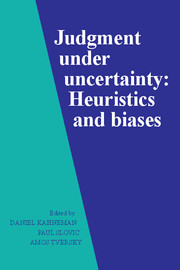Book contents
- Frontmatter
- Contents
- List of contributors
- Preface
- Part I Introduction
- Part II Representativeness
- Part III Causality and attribution
- 7 Popular induction: Information is not necessarily informative
- 8 Causal schemas in judgments under uncertainty
- 9 Shortcomings in the attribution process: On the origins and maintenance of erroneous social assessments
- 10 Evidential impact of base rates
- Part IV Availability
- Part V Covariation and control
- Part VI Overconfidence
- Part VII Multistage evaluation
- Part VIII Corrective procedures
- Part IX Risk perception
- Part X Postscript
- References
- Index
7 - Popular induction: Information is not necessarily informative
Published online by Cambridge University Press: 05 May 2013
- Frontmatter
- Contents
- List of contributors
- Preface
- Part I Introduction
- Part II Representativeness
- Part III Causality and attribution
- 7 Popular induction: Information is not necessarily informative
- 8 Causal schemas in judgments under uncertainty
- 9 Shortcomings in the attribution process: On the origins and maintenance of erroneous social assessments
- 10 Evidential impact of base rates
- Part IV Availability
- Part V Covariation and control
- Part VI Overconfidence
- Part VII Multistage evaluation
- Part VIII Corrective procedures
- Part IX Risk perception
- Part X Postscript
- References
- Index
Summary
The cognitive theory that currently exerts the greatest influence on social psychologists is attribution theory, the formalized version of which was introduced by Harold Kelley in 1967. The theory poses a view of man as lay scientist, attempting to infer causes for the effects he observes. The causes he attributes determine his view of his social world, and this view may determine his behavior. An extremely broad range of phenomena, from Asch's conformity research to Schachter's emotion work, may be usefully described as instances of the causal attribution process at work. In fact, it seems quite possible that Kelley's most important contribution may ultimately be seen to have been his creation of a language, or roadmap, with which to describe and interrelate diverse social psychological phenomena.
In addition to his organizational contribution, Kelley posited three formal sources of influence on the causal attribution process. In attempting to attribute causes for events of the form “Actor responds in X fashion to situation A,” the lay attributor responds to three sources of information: distinctiveness information (Does the actor respond in X fashion in all situations of the general type, or only in situation A?); consistency information (Does the actor respond in X fashion at all times, under a broad variety of circumstances, or does he respond in X fashion only occasionally?); and consensus information (Do most other actors respond in X fashion, or is the response relatively rare?).
Information
- Type
- Chapter
- Information
- Judgment under UncertaintyHeuristics and Biases, pp. 101 - 116Publisher: Cambridge University PressPrint publication year: 1982
Accessibility standard: Unknown
Why this information is here
This section outlines the accessibility features of this content - including support for screen readers, full keyboard navigation and high-contrast display options. This may not be relevant for you.Accessibility Information
- 75
- Cited by
